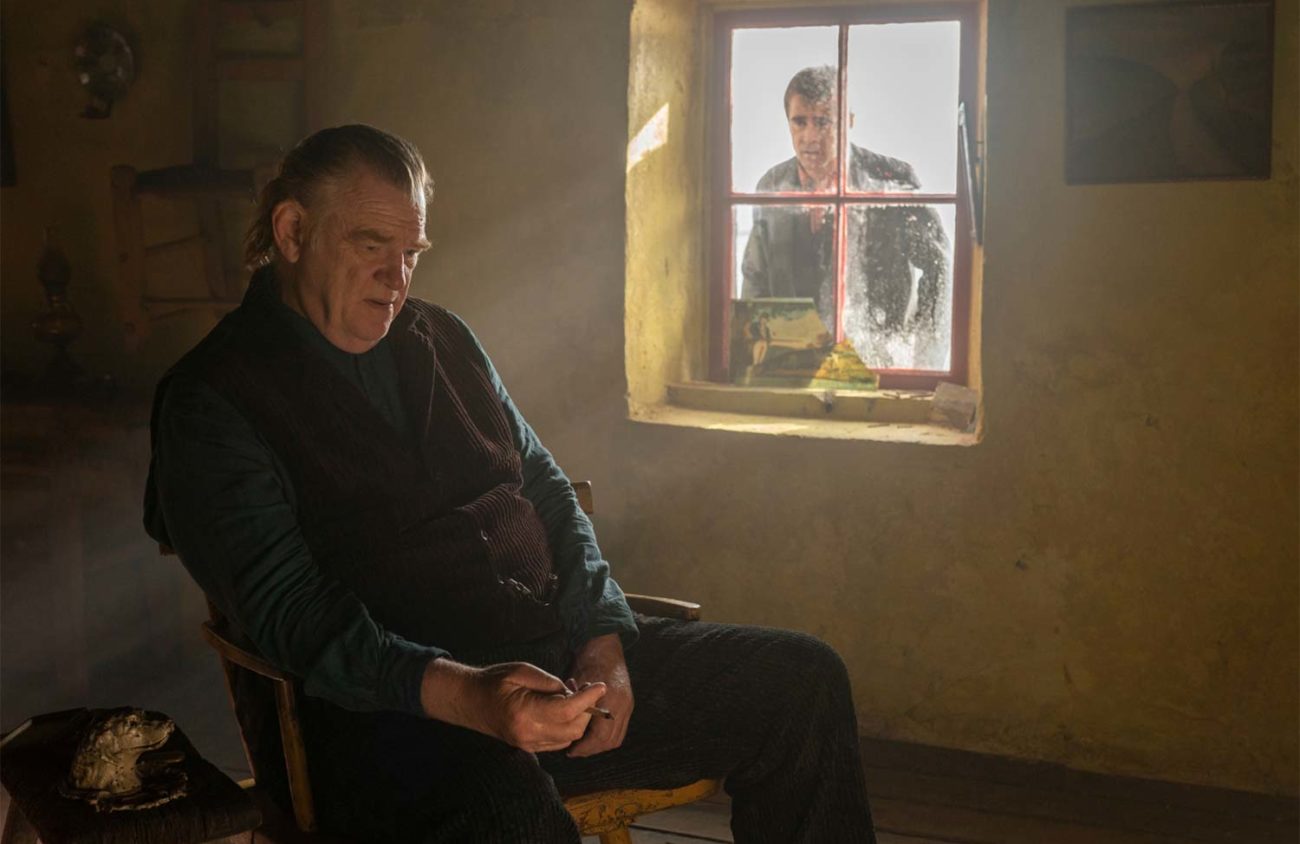It was Hegel who famously quipped that all we really learn from history is that people learn nothing from history. Yowza, right? And so here we are now, today, on the verge of another global catastrophe, with seemingly every nasty chicken of the 20th century coming home to roost all at once, and each of us poor souls making murder lists of folks to blame. Feckin’ hell, I say.
So what’s all this philosophical bunkum to do with a small (fictional) island in Ireland in 1923, with the Irish Civil War blasting away across the water on the mainland, and one friend, Colm (Brendan Gleeson), deciding all of a sudden that he absolutely and incontrovertibly no longer likes his dear bosom pal and drinking companion, Pádraic (Colin Farrell), a sweet lunkhead who lives a simple existence in a farmy shack with his beautiful, bookish sister Siobhán (Kerry Condon)?
Eh, probably nothing. Then again, maybe history is calling once more…
This is the simple but elegant premise of The Banshees of Inisherin, the hilarious and heartbreaking new film by Irish playwright-turned-cinematic auteur Martin McDonagh (In Bruges, Three Billboards Outside Ebbing, Missouri). It is a quiet, economical film — a chamber piece, really, ready-made for the stage — that nonetheless captures ripping thunderclaps of emotional devastation, like a shipwreck in a bottle. It portrays a bro-mantic disaster in slow motion, a comic fugue rendered in a minor key, containing equal parts slapstick, satire and domestic tragedy.
McDonagh, who first made a name for himself as the “bad boy” playwright of the European stage — foul-mouthed, big-hearted and an equal opportunity flayer of human pieties and hypocrisies — here returns to his roots in Irish grotesquery, rural and impacted. Whereas Three Billboards was a broad and brilliantly Americanized tour of his whiplash talents, zippy and loose-limbed, this film unfolds on its own sweet time, moving with the leisurely pace of the horse-drawn cart Pádraic drives to town.
But it is a sad thing to equate pacing with intensity. This film is wildly intense, in its own itchy, subtle way. Into all the apparent littleness of its context and setting, McDonagh packs devious loads of complex existential zing. Going into the movie, I assumed the wallop of Banshees would derive from the mystery of why Colm unfriends Pádraic, but McDonagh has other fish to fry. It’s no mystery at all.
Fairly early on in the proceedings, Colm reveals that, considering the state of the world and the nature of existence, he no longer has a moment to waste on pointless banter. He tells Pádraic, in no uncertain terms, that he finds him dull, and that his companionship is getting in the way of his songwriting, which is his only path to immortality. With the world unraveling and death nipping at his heels, Colm argues, what is the point of maintaining a friendship nobody will remember in 50 years?
So there’s the rub. McDonagh, with the acuity of Swift and the absurdity of Beckett, ekes out a creeping threat of meaninglessness that is infecting not just Colm but every character in the film — indicated in part by the distant reverberations of bombs going off as the Irish troubles rage on across the way. The world is tipping into chaos, and if Pádraic is just too dim and parochial to realize it, feck him. Kindness, much less love, never did a damn thing to fend off the mortal reckoning we all face, right?
In fact, Colm is so passionate, or deranged, in his dismissal of Pádraic that he threatens to cut off one finger with a sheep shears for every time he tries to talk to him. Talk about escalating the matter, which is exactly what happens, with unexpected collateral damage. This is the set-up for the grimmest fairy tale, a dark parable for our times, and it plays out as such — right up to the knowing old crone Mrs. McCormick (Sheila Flitton), who haunts the film like a witchy vision of Fate, or Death, itself.
Gleeson and Farrell, two of the more interesting actors in the business right now, are so perfectly cast that even their silences crackle, and should such a thing be necessary, they alone could carry this film. As it is, however, they are rivaled and, in a sense, mirrored by a pair of accompanying performances: that of Condon as Pádraic’s sister, along with the excellent Barry Keoghan as Dominic, a chronic fuck-up of a kid whose besieged naivete functions, ironically, as the film’s moral compass. It’s tough to conjure a movie in recent memory that is buoyed by a stronger quartet of performances.
An Irish writer through and through, McDonagh’s dark, bawdy humor and brutal wit hide the aching heart of a humanist, and this is his most effective film so far, as well as his most touching and haunting. The Banshees of Inisherin finds a perfect balance among his formidable talents, not least of which is his visual sense — the cinematography (by Ben Davis) is gorgeous. It’s a nearly flawless movie, and my great hope is that it finds the audience it deserves — as the troubles continue unabated, and dull old kindness in flight seeks its shrinking refuge.
The Banshees of Inisherin is showing at Broadway Metro, 43 West Broadway, and AMC CLASSIC Corvallis 12, 750 NE Circle Boulevard, Corvallis.
